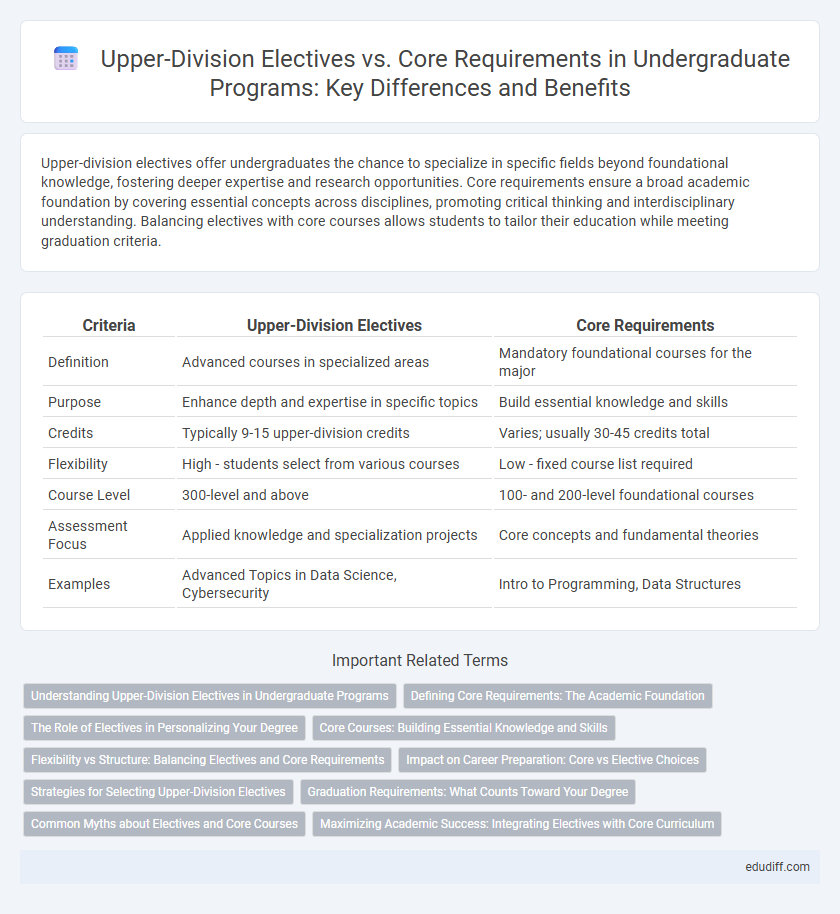Upper-division electives offer undergraduates the chance to specialize in specific fields beyond foundational knowledge, fostering deeper expertise and research opportunities. Core requirements ensure a broad academic foundation by covering essential concepts across disciplines, promoting critical thinking and interdisciplinary understanding. Balancing electives with core courses allows students to tailor their education while meeting graduation criteria.
Table of Comparison
| Criteria | Upper-Division Electives | Core Requirements |
|---|---|---|
| Definition | Advanced courses in specialized areas | Mandatory foundational courses for the major |
| Purpose | Enhance depth and expertise in specific topics | Build essential knowledge and skills |
| Credits | Typically 9-15 upper-division credits | Varies; usually 30-45 credits total |
| Flexibility | High - students select from various courses | Low - fixed course list required |
| Course Level | 300-level and above | 100- and 200-level foundational courses |
| Assessment Focus | Applied knowledge and specialization projects | Core concepts and fundamental theories |
| Examples | Advanced Topics in Data Science, Cybersecurity | Intro to Programming, Data Structures |
Understanding Upper-Division Electives in Undergraduate Programs
Upper-division electives in undergraduate programs offer specialized courses that allow students to tailor their academic experience toward specific interests within their major. These electives typically require completion of foundational core requirements and provide deeper knowledge, enhanced critical thinking, and practical skills relevant to advanced topics. Choosing electives strategically can improve expertise, increase career readiness, and support graduate school preparation.
Defining Core Requirements: The Academic Foundation
Core requirements serve as the fundamental academic foundation for undergraduates, ensuring mastery of essential knowledge and skills critical to their discipline. These structured courses provide a cohesive framework that supports specialized learning and prepares students for advanced upper-division electives. Defining core requirements involves identifying key concepts, methodologies, and competencies that uphold academic standards and promote intellectual rigor across programs.
The Role of Electives in Personalizing Your Degree
Upper-division electives offer undergraduate students the flexibility to tailor their academic experience by selecting courses aligned with their interests and career goals, complementing the foundational knowledge gained through core requirements. These electives enable deeper specialization within a major or interdisciplinary exploration, enhancing both intellectual growth and professional preparedness. Personalized degree pathways created through strategic elective choices improve student engagement and better position graduates for diverse opportunities in competitive job markets.
Core Courses: Building Essential Knowledge and Skills
Core courses in undergraduate programs establish essential knowledge and skills foundational to a student's major, ensuring a comprehensive understanding of key concepts and methodologies. These courses are designed to develop critical thinking, analytical abilities, and practical competencies necessary for advanced study and professional success. Emphasizing core requirements guarantees that students acquire a well-rounded education that supports upper-division electives and specialized fields.
Flexibility vs Structure: Balancing Electives and Core Requirements
Upper-division electives offer undergraduate students the flexibility to explore specialized topics aligned with their interests and career goals, enhancing academic engagement. Core requirements provide a structured foundation of essential knowledge and skills critical for discipline mastery and professional readiness. Balancing these elements ensures a comprehensive education, blending depth in major areas with breadth through diverse elective courses.
Impact on Career Preparation: Core vs Elective Choices
Upper-division electives provide specialized knowledge allowing undergraduates to tailor their skill sets toward niche career paths, enhancing employability in specific industries. Core requirements establish a foundational understanding of essential theories and practices, ensuring a broad competency that supports versatility in the job market. Balancing core courses with strategic electives maximizes career readiness by combining comprehensive knowledge with targeted expertise.
Strategies for Selecting Upper-Division Electives
Selecting upper-division electives requires aligning course choices with your academic strengths, career goals, and graduation requirements to maximize both knowledge depth and transcript value. Prioritize electives that complement core major courses while offering opportunities for specialization, skill acquisition, or interdisciplinary exploration. Utilize advising resources and analyze course prerequisites, workload, and professor evaluations to strategically plan a balanced and impactful upper-division schedule.
Graduation Requirements: What Counts Toward Your Degree
Upper-division electives provide specialized knowledge beyond core requirements, allowing undergraduates to tailor their academic experience to specific interests and career goals. Core requirements ensure foundational skills and broad disciplinary understanding essential for degree completion. Both components accumulate credits that fulfill graduation requirements, with core courses typically mandatory and upper-division electives offering flexibility within the major or related fields.
Common Myths about Electives and Core Courses
Undergraduate students often misunderstand the role of upper-division electives, mistakenly believing that these courses are less critical than core requirements; however, electives provide specialized knowledge that enhances a major's depth and prepares students for career-specific skills. Core courses establish essential foundational concepts mandated by accreditation standards, ensuring a comprehensive understanding of the discipline. Clarifying that electives complement rather than replace core requirements helps students optimize their academic planning and fulfill graduation criteria efficiently.
Maximizing Academic Success: Integrating Electives with Core Curriculum
Strategically selecting upper-division electives that complement core requirements enhances depth in specialized fields while reinforcing foundational knowledge. Integrating electives aligned with major objectives fosters interdisciplinary connections, boosting academic performance and career readiness. Prioritizing electives that build on core competencies maximizes credit efficiency and promotes skill diversification essential for advanced study and professional growth.
Upper-Division Electives vs Core Requirements Infographic

 edudiff.com
edudiff.com